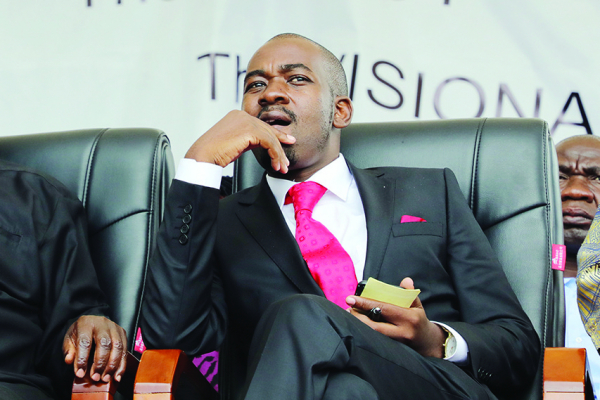MDC Alliance presidential candidate, Nelson Chamisa has warned the British government that overlooking crucial democratic reforms in favour of managing political stability in Zimbabwe could lead to post-election instability.
Speaking at Chatham House in London on Tuesday, Chamisa expressed concern over what he said was the inclination of the British government in Zimbabwe "to align with one political party against another".
"We have seen that there has been a bit of a shift on the part of the British government in terms of focusing more on political stability and trade and commerce at the expense of democracy. But that is a false narrative, you can never have stability without democracy," he said.
"We expect Britain and the EU to speak for free and fair elections. There's a very disturbing trend in the context of the British government in Zimbabwe. We're seeing the inclination to align with one political party against another. That is disturbing, particularly in terms of the issue of just setting the basic standard for free and fair elections.
"Because, for a long time, the British government has been emphasising norms, values – let those norms and values of free and fair elections be respected. That is all we want – we're not asking for money. We're asking for the solidarity of a global coalition for free and fair elections."
Under the New Labour administration from 1997 to 2010, Britain maintained vocal criticism of human rights abuses and violations of the rule of law in Zimbabwe as part of what it called an "ethical foreign policy". However, with the return of the Conservative party to Number 10 Downing Street, Britain has focused more on re-engagement to promote business and stabilise the economy rather than advance democracy.
This has earned vicious criticism from opposition voices. PDP president and MDC Alliance partner, Tendai Biti, who is travelling with Chamisa, called out the current British ambassador to Zimbabwe, Catriona Laing, in 2016, accusing her of supporting the then-Vice President Emmerson Mnangagwa's presidential ambitions.
"[They] are arguing that Zimbabwe needs a strongman. By that they mean a man called Emmerson Mnangagwa, who suddenly is a reformer," Biti charged at the time.
However, Britain's apparent shift of policy from an emphasis on human rights to business is not only confined to Zimbabwe.
In February this year, the state-run media in China commended British Prime Minister Theresa May, during an official visit to that country, for sidestepping human rights issues in favour of "pragmatic collaboration" with China.
However, Chamisa warned that this focus on the maintenance of stability with a strongman in power at the expense of thoroughgoing democratisation could in fact set the country up for post-election instability. During his week-long visit in London, he will be meeting senior UK government officials, including Foreign Secretary Boris Johnson and the Labour leader Jeremy Corbyn.
Chamisa also accused Mnangagwa of being clueless on arresting high-level corruption in the public sector, which he blamed for the economic meltdown.
He said while Mnangagwa was going across the globe claiming Zimbabwe was open for business, the Zanu PF leader was actually a beneficiary of graft.
"We can't be open for business when we have people who are open for corruption," he said.
Chamisa said Mnangagwa, who has hinged his campaign on fighting corruption and opening Zimbabwe for business, could not deal with the scourge because he was a beneficiary.
"We can't transform the economy without dealing with corruption," he said.
"Corruption has been the biggest challenge of Zimbabwe and this is why it is impossible to expect the new out of the old because they have been part of the establishment of the infrastructure of corruption.
"They will not reverse it because reversing it means loss, means a negative reversal of the ill-gotten wealth, so we need to deal with corruption in a very radical manner."
Chamisa challenged the new dispensation narrative saying Zimbabwe remained figuratively under the control of former President Robert Mugabe.
"Yes people are saying Mr Mugabe is gone, yes he is gone, but the old is dying without the birth of the new, yes Mugabe is out, but Mugabeism is alive, the system is very much in place."
Chamisa called for a radical transformation of governance systems.
"We need to move from the situation of suspicion between the government and the governed so that the State is not seen as a prosecutor but as a protector, not as a perpetrator but defender," he said.
But, Mnangagwa who was recently in Qatar defended his anti-corruption drive saying he was moving to ensure that all government departments in the fight of the scourge pull in one direction and he would fire those who resisted.
"My administration is not going to tolerate any form of corruption at any level," he was quoted saying.
"To do this, we need the support of other institutions the police, judiciary, the anti-corruption commission and the National Prosecuting Authority, we are in the process of making them pull in one direction."
- newsday
 Concern over Masvingo black market
Concern over Masvingo black market  Kenya declares three days of mourning for Mugabe
Kenya declares three days of mourning for Mugabe  UK's Boris Johnson quits over Brexit stretegy
UK's Boris Johnson quits over Brexit stretegy  SecZim licences VFEX
SecZim licences VFEX  Zimbabwe abandons debt relief initiative
Zimbabwe abandons debt relief initiative  European Investment Bank warms up to Zimbabwe
European Investment Bank warms up to Zimbabwe  Young Investment Professional (YIP) Graduate Programme 2019
Young Investment Professional (YIP) Graduate Programme 2019 











 Young Investment Professional (YIP) Graduate Programme 2019
Young Investment Professional (YIP) Graduate Programme 2019
Editor's Pick